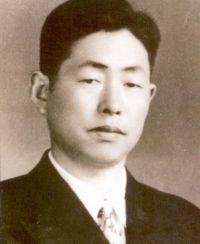Zheng Lvcheng
Zheng Lvcheng (Chinese:郑律成) was an outstanding composer in China and was also known as a soldier of internationalism. Zheng was born in a poor revolutionary family in South Jeolla, South Korea, in 1918. His father was a patriot, and his three elder brothers devoted their life to the revolutions in Korea and China. In 1933, Zheng came to China with some progressive youths from Korea and engaged in revolutionist activities while also studying music at the same time. Zheng then went to Yan'an at the age of 19 and joined the Communist Party of China (CPC) in January 1939.
Zheng saw and heard many moving sagas about the Chinese army when he lived in Yan'an from 1937 to 1942. Such sagas included "Autumn Harvest Uprising," "Zunyi Meeting," "The Long March," and "The Red Army Crossed the Snow Mountain and the Marshy Grasslands," all of which became material for inspiration in his music. He cooperated with Gong Mu to write the "Eighth Route Army Chorus" under the influence of the "Yellow River Chorus," written by Xian Xinghai. Zheng embedded his love for the people's army into this music. The Eighth Route Army March Song was later named "People's Liberation Army (PLA) March Song" and broadcasted at Tian'anmen Square during the founding ceremony of the People's Republic of China in 1949. It was also selected as the army song of the PLA.
Zheng Lvcheng traveled to many places in China to collect information and inspiration for his music after 1949. By the time of his death on Dec. 7, 1976, he had composed more than 300 pieces of music. The "PLA March Song" and the "Korean People's Army March Song" are Chinese and Korean army songs, respectively, both composed by Zheng.
